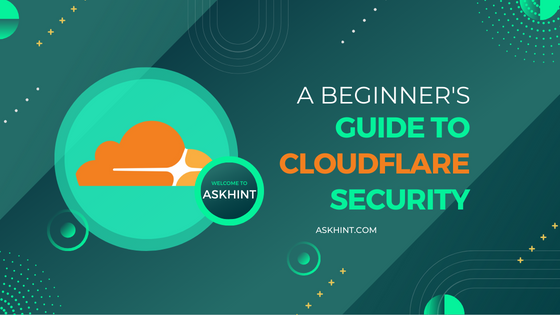Are you worried about hackers and other cybercriminals infiltrating your website? If so, you’re not alone! Millions of businesses have invested in cloud-based cybersecurity solutions designed to protect their data and online presence. One of the most popular offerings is Cloudflare security, which can help ensure that your website is safe from malicious attacks. But what exactly is Cloudflare security, and how does it work? In this blog post, we’ll break down the basics of Cloudflare security for beginners, including its features, benefits, and tips for getting started.
What is Cloudflare?
Cloudflare is a content delivery network (CDN) and distributed domain name server (DNS) service that accelerates and secures websites. It is one of the largest internet security companies in the world, with over 20 million customers and 10 trillion internet requests processed per day. Cloudflare’s services sit between a website’s visitor and the site’s origin web server, acting as a reverse proxy for web traffic. This allows Cloudflare to protect and accelerate websites while also reducing bandwidth costs.
Cloudflare’s Security Features
Cloudflare is a web security company that provides a number of features to help secure your website. Some of their features include:
-DDoS Protection: Cloudflare’s DDoS protection defends against attacks that attempt to overload your server with traffic in order to take it down.
-SSL/TLS Encryption: Cloudflare offers SSL/TLS encryption for all data passing between your visitors and your website. This helps protect against eavesdropping and man-in-the-middle attacks.
-Firewall: Cloudflare’s firewall protects your website from malicious traffic, blocking requests that may contain malware or other threats.
-Bot Management: Cloudflare’s bot management system helps identify and block malicious bots that may be trying to access your website.
-Access Control: Cloudflare’s access control features let you restrict access to your website based on IP address, country, or other criteria. This can help prevent unauthorized access or denial of service attacks.
-Analytics and Logging: Cloudflare’s analytics and logging features help you monitor performance, identify threats, and troubleshoot issues.
-Security Scanning: Cloudflare can scan your website for malware, phishing attempts, and other security threats.
How to Use Cloudflare
Assuming you have a Cloudflare account (if not, sign up for free here), using Cloudflare is easy. Simply change your domain’s DNS settings to point to Cloudflare’s servers, and your website will begin benefit from their security measures.
Once your site is set up on Cloudflare, there are a few key things you can do to further secure it:
1. Use their SSL/TLS feature to encrypt communication between your visitors and your website. This is especially important if you have an ecommerce site or any kind of site where users input sensitive information.
2. Take advantage of their DDoS protection features to protect your site from attacks that could take it offline.
3. Use their Firewall Rules feature to block malicious traffic before it ever reaches your server. This can prevent a lot of headaches down the line, as well as save you money on bandwidth costs.
4. Enable Two-Factor Authentication for additional security when logging in to your Cloudflare account.
5. Keep an eye on the analytics provided by Cloudflare so that you can spot potential threats early and take action accordingly.
By using Cloudflare, you can rest assured that your website is as secure as possible. That said, it’s still important to take the necessary precautions and monitor your site regularly to ensure its security.
Cloudflare Alternatives
There are a number of Cloudflare alternatives available, each offering their own unique set of features and security benefits. Below, we’ve outlined some of the most popular Cloudflare alternatives currently available.
Incapsula: Incapsula is a cloud-based security platform that offers DDoS protection, bot management, and web application firewall (WAF) capabilities. One of the main benefits of Incapsula is that it integrates seamlessly with existing network infrastructure, making it an ideal solution for businesses that are looking to add an extra layer of security to their online presence.
Imperva: Imperva is another cloud-based security platform that offers DDoS protection, WAF capabilities, and bot management. Like Incapsula, Imperva integrates seamlessly with existing network infrastructure and offers a variety of flexible pricing options to suit the needs of any business.
Sucuri: Sucuri is a cloud-based security platform that specializes in website security. Sucuri offers DDoS protection, malware removal, and WAF capabilities. Sucuri also offers a variety of tools to help businesses secure their websites and protect their online reputation.
ArvanCloud: ArvanCloud is a cloud-based security platform that offers DDoS protection, bot management, and WAF capabilities. ArvanCloud also offers a range of other features designed to help businesses secure their websites such as geo-blocking, rate limiting, and malware scanning.
StackPath: StackPath is a cloud-based security platform that provides DDoS protection, web application firewall (WAF) capabilities, and bot management. StackPath also offers tools to help businesses monitor their websites for malicious activity and quickly respond to threats.
Conclusion
In conclusion, Cloudflare security is a fantastic and easy way to ensure your website remains protected from malicious attacks. It’s user-friendly, cost-effective, and can be set up in just a few steps. With Cloudflare’s various plans available you should be able to find one that fits your budget and provides the level of protection needed for your website. Additionally, there are plenty of resources online which will help you better understand how Cloudflare works allowing you to make the most out of it for protecting your site.



